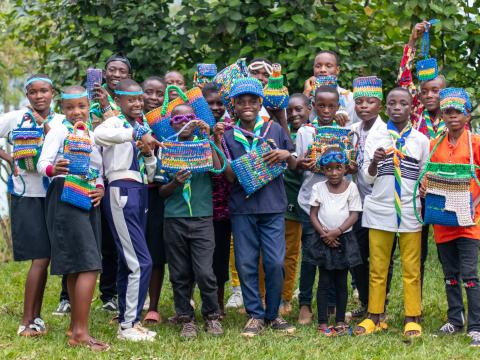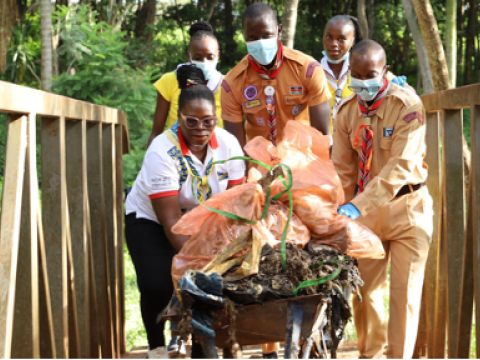Scouts Influencing Behaviour Change on Plastic Pollution in Madagascar
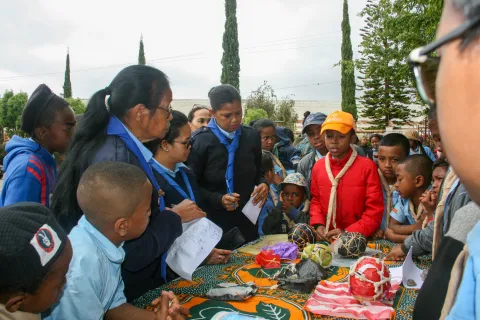
Since 2022, the Plastic Tide Turners Challenge Project in Madagascar has been encouraging over 4,500 young people to become aware of the issues that threaten our planet, among them plastic pollution, inspiring them to develop leadership and advocacy skills and engage in innovative and challenging activities that help to protect the environment.
Madagascar is one of the countries most at risk from environmental damage, including growing concerns about plastic pollution. A study conducted in 2017 by researchers at the University of Oregon found that plastic already accounted for more than 62 percent of the debris recorded on some beaches in Madagascar. Since most of the debris comes from land-based sources, their recommendations were already raising awareness at the time about plastic pollution issues and the need to reduce the amount of debris that ends up on beaches. On a larger scale, to advocate for a policy focused on recycling, reducing the excessive use and targeting of non-biodegradable materials, such as plastics, could have a positive impact on reducing plastic waste on beaches and in marine environments.
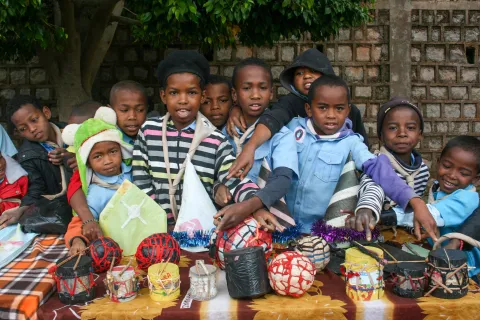
Education and Awareness
Through the Plastic Tide Turners Challenge Project young people have been introduced to good practices regarding the use of plastics. Scouts who complete the project activities are awarded with the Plastic Tide Turners badges as a symbol of achievement and learning.
From organizing Scout camps, clean-up activities, and training opportunities at least 1,940 young people (80 Rovers, 60 Scouts, 1500 Cub Scouts, and 300 non-Scouts) have been reached in Morindava, Majunga and Anatananrivo. In the town of Fenoarivo, working with a group of 20 Scouts, over 300 community members have been sensitized on how to separate waste, while a further 500 were reached during a national camp.
Some of the learning activities the Scouts have been engaged in include national competitions for making and selling of handicrafts from plastic waste, distributing plastic waste collection bins to local communities and schools, conducting cleanups to gather plastic waste, training on how to reduce, reuse and recycle plastic waste, and awareness talks on environmental protection.
In Akamasu, a settlement for homeless people, 34 Scouts conducted a training on the SDGs and environmental protection that was attended by 200 participants.
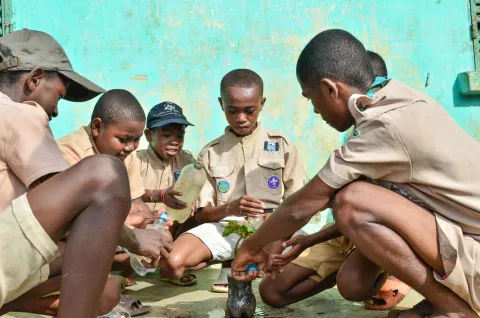
Integrating Plastic Education into Youth Programme
The project has contributed greatly to building the capacity of Scout Leaders and adult volunteers by systematically integrating the Plastic Tide Turners Challenge into the youth programme and community initiatives to ensure sustainable implementation and to provide continuous training beyond the project period.
To date at least 70 adult leaders have been trained on the implementation of the Plastic Tide Turners Challenge. These leaders have gone on to deliver training to an additional 600 adults at numerous workshops on Plastic Tide Turners and Environmental Conservation. To support this, a guide for integrating the Plastic Tide Turners Challenge into adult leader training in each branch of Scouting has been developed.
Over 500 Scouts who had successfully completed the badge requirement have been awarded with the Plastic Tide Turner badges. An additional 1000 Scouts across the three Associations will be awarded in the coming months as they are in the process of completing the badge requirements.
As a result of these educational activities, the Scouts have seen a growth in more young people joining the movement with new groups established in the areas where the project is being implemented.
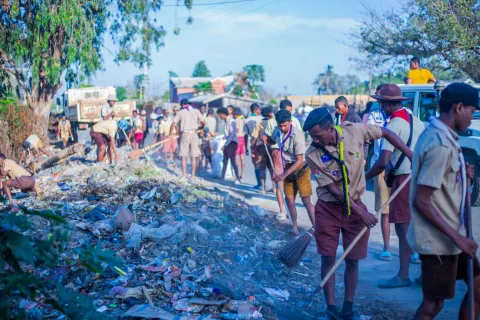
Working with Local Partners to spur Education, Innovation and Enterprise
The project has created opportunity for the Scouts to develop partnerships with local partners that include, local governments, international and national organizations to strengthen their ability to achieve greater impact.
With the blessing of the local community, the Mayor of Fenoarivo, has given land for the Scouts to build a waste separation and recycling plant. Here, in partnership with a Mauritian University, they will turn waste plastic into useful items like blocks for paving and furniture making. The Ministry of Scientific Research is offering technical support to develop the scientific processes to be used in the waste recycling.
Catholic Relief Services supported the organizing of National Clean-up Day in Antananarivo. UNICEF are assisting with training of youth advocates while WWF collaborates with the Scouts on the annual Earth Hour campaign to shine a light on environmental conservation and nature protection.
To promote youth innovation, the Scouts opened a call for funding where two regions received financial support to implement innovative plastic waste management projects over a period of six months.
As part of the centenary celebrations of Tily eto Madagasikara in 2024, the Scouts will implement 100 projects by Rover Scouts covering educational activities to develop motivation and interest in plastics recycling and demonstrate skills in reusing plastic for the protection of the planet. A catalogue of the 100 projects will be developed with stories, impact and change realized, and disseminated publicly and the best ones awarded.
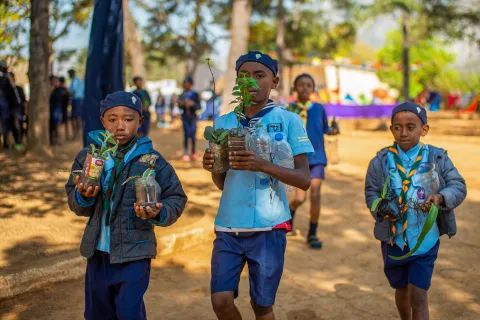
Influencing Policy Change through Advocacy
To ensure the effective participation of young people in decision-making process, this project put in place measures for the involvement of National Scout Youth Advisors in the design and implementation of activities. Working in partnership with other youth organizations in the country, Scouts are leading advocacy efforts and driving change to combat plastic pollution.
A team of 45 young people, among them National Scout Youth Advisors, have been trained, empowered and endorsed by the General Assembly to become Scout Ambassadors for the SDGs and a leading voice in advocating for policy change to address plastic pollution in the country with the support of UNICEF and WWF. They are organizing boot camps with UNICEF to train 2,000 more young people from all districts in advocacy over a period of two years. With WWF during Earth Hour the Scouts conducted advocacy on environmental protection and screened a movie on the need to protect the planet in a public high school with 100 students.
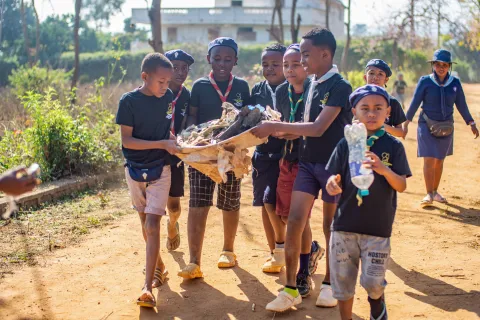
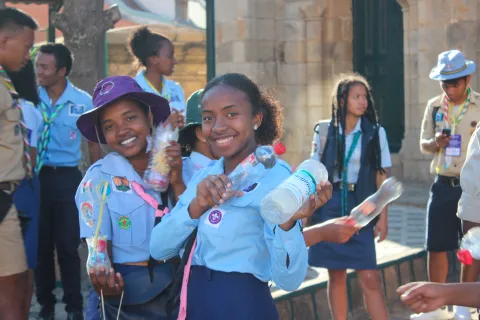
By participating in the project, the young people become influencers for positive behaviour and attitude change amongst their peers, families and in their respective communities. Their actions are also helping to create a culture of environmental responsibility, generating lasting change towards waste management and plastic pollution.
This project was implemented as part of the Scouts for SDGs global initiative, thanks to the longstanding support and partnership of Alwaleed Philanthropies via the World Scout Foundation. Scouts for SDGs enables young people with skills for life and empowers them to take the lead in community development efforts to support the achievement of the Sustainable Development Goals (SDGs).
